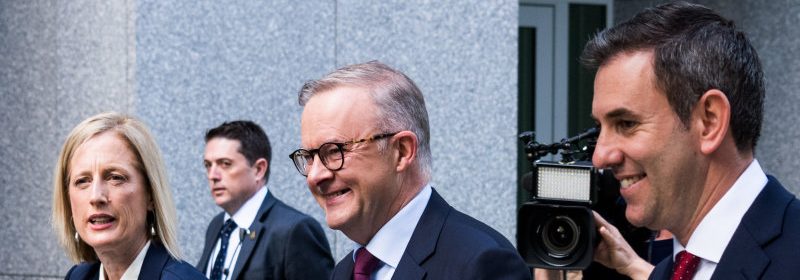Labor’s budget is aspirational, but the proof will be in the pudding

It was an aspirational budget, with much of it nothing more than confirmation of Labor’s electoral promises. But the government’s biggest challenge will be in the implementation.
The reduction in the qualifying age for downsizer contributions to age 55 has been in the pipeline for months and will do little for anybody downsizing now because the qualifying age for non-concessional contributions has already been raised to 75.
Labor’s budget was aspirational, but the proof now will be in the pudding.Credit:James Brickwood
The increase in the income test threshold for the Commonwealth Seniors Health Card to $90,000 for a single and $144,000 for a couple was an election promise by the Morrison government which was matched immediately by Labor. The increase in the amount that an income-tested pensioner can earn from work by $4000 a year was the result of a campaign by National Seniors – but will reset to just $7800 on 1 July next year. This is a welcome and much-needed measure, but why impose a time limit if the aim is to help ordinary pensioners cope with the increased cost of living?
The confirmation of the freezing of deeming rates until June 30, 2024, is a strange one. The present ones are way out of kilter in a climate of rising interest rates. Currently, singles are deemed 0.25 per cent on the first $56,400 a year and couples 0.25 per cent on the first $93,600 a year. The excess is deemed at 2.25 per cent. It makes no sense to freeze the deeming rates until June 2024, while chopping back the amount pensioners can earn till next July.
Major issues in the budget were more access to childcare, increased wages for aged care staff, and putting at least one nurse into every aged care home on a 24/7 basis. The operational challenges here are that most childcare centres have a waiting list, there are virtually no nurses available for aged care, and a big increase in nursing staff wages will add to the already spiralling aged care costs.
But the bigger issue was affordable housing, with the stated ambition of “building one million, new well-located homes over five years from 2024”. Well, to quote from the iconic movie The Castle “tell him he’s dreaming.”
Speak to anybody in the building industry, and they will talk about the massive shortage of both materials and manpower, exacerbated by the rebuilding necessary as a result of floods and fires. The resources are just not available.
Home affordability remains a serious issue, but it’s getting worse as rates rise. Just three years ago – depending on where you live – a good first home may have cost around $620,000. Interest rates then were 2.5 per cent so anybody with a 20 per cent deposit could borrow $493,000 over 30 years with repayments of $1,948 a month.
This, of course, assumes they have the resources to save a 20 per cent deposit of $123,200 to avoid costly mortgage insurance and much higher repayments. My friendly mortgage broker tells me that the criteria for a couple with two children and no other debts would have been an annual income of $55,000 each or a family income of $110,000 a year.
Today, that same house would probably cost around $865,000 – a loan of 80 per cent of the purchase price would be $691,000. This would require repayments of $4143 per month over 30 years if rates were 6 per cent. The increase in monthly repayments is $2165 or $500 a week. The deposit needed would have skyrocketed to $173,000. The criteria for a couple would become $80,000 each or $160,000 a year combined.
In just three years the 20 per cent deposit has risen by almost $50,000, while the wages needed to service the loan to buy that property have increased by 45%.
There is no simple solution – every time the Reserve Bank increases interest rates, another group of potential homebuyers are locked out of the market. It’s inevitable that the cash rate will be 4 per cent by this time next year, and mortgage rates may well be hovering around 7 per cent. It’s a sad dilemma for anybody contemplating buying a home.
- Advice given in this article is general in nature and is not intended to influence readers’ decisions about investing or financial products. They should always seek their own professional advice that takes into account their own personal circumstances before making any financial decisions.
Noel Whittaker is the author of Retirement Made Simple and numerous other books on personal finance. Email: [email protected]
Most Viewed in Money
From our partners
Source: Read Full Article

